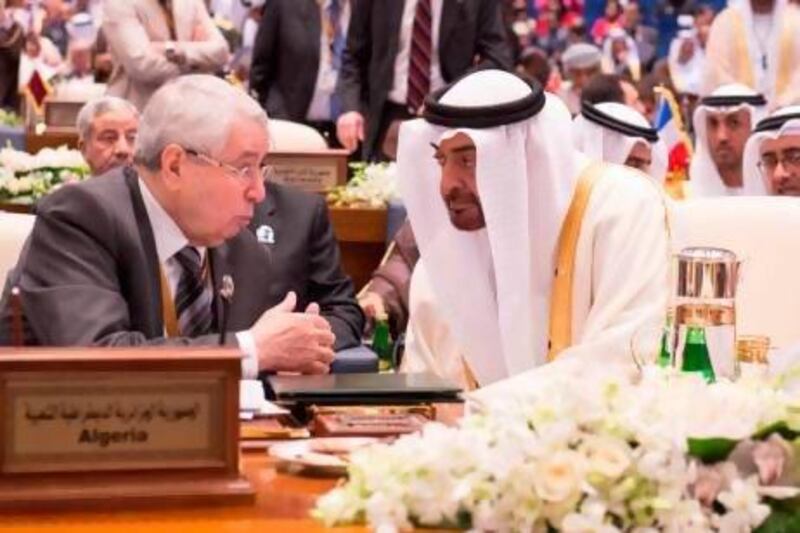KUWAIT CITY //The UAE yesterday pledged US$300 million, more than Dh1 billion, in humanitarian aid to Syrians devastated by a 22-month civil war.
Sheikh Mohammed bin Zayed, the Crown Prince of Abu Dhabi and Deputy Supreme Commander of the Armed Forces, said the donation was an expression of the UAE's "support for the brotherly people of Syria".
In a speech to delegates at a UN-backed conference that raised more than $1.5 billion, Sheikh Mohammed described the suffering of the Syrian people as "great and terrible".
Saudi Arabia and Kuwait also pledged $300m, bringing the total contribution from Arabian Gulf states to nearly $1bn. The exact contributions were being tallied late yesterday.
The UN secretary general Ban Ki-moon said the donations would help to "pull Syria out of its death spiral", which he blamed on the regime in Damascus.
"Primary responsibility rests with the Syrian government, with President Assad. He should listen to the voices and cries of so many people whose families and mothers and brothers and sisters who have been killed. They are honestly wishing for a democratic and peaceful country," Mr Ban said.
More than 60,000 people have been killed since the conflict began, according to the UN, and four million Syrians inside the country need food, shelter and other aid. An estimated 700,000 have fled to neighbouring countries.
The pledges from Arabian Gulf countries now rank them among the most generous contributors to relief in Syria. UN operations to this point have relied heavily on western contributions.
But as the one-day conference closed yesterday, it was not clear exactly how all the pledged funds would be allocated. Some donors, such as the European Union and the United States, which pledged an additional $370 million and $155 million respectively, have already said which UN agencies will benefit from their contributions.
Some regional countries, however, have raised concerns about operating through UN agencies, and may prefer to direct their contributions through their other charities.
The concerns stem from issues raised by the Syrian opposition coalition, which last week sharply criticised the United Nations' relief strategy for being drafted in cooperation with the government in Damascus.
"The Gulf countries take different views, some would be more keen to deliver through organisations they work with and some would be more willing to work with the United Nations," said Kristalina Georgieva, EU commissioner for international cooperation, humanitarian aid and crisis response. "[Some delegations] are concerned that the UN may be perceived to be associated with the Syrian regime, which is not true. In the humanitarian world, we have to get permission to operate."
Among the chief concerns raised by the Syrian opposition is the question of humanitarian access, said Khaled Al Salih, a member of the group's executive board. "The UN doesn't actually distribute to the northern part of Syria, they are only able to operate in Assad-controlled areas," he said.
But the United Nations was at pains to reassure delegates that its assistance has been impartial. And UN officials argued that their difficulties operating in opposition-held areas were due in part to the complex challenge of navigating a labyrinth of rebel militias.
"While there is coordination [of the opposition] abroad through the Syrian National Coalition, there are hundreds of militia-style organisations on the ground that are not necessarily coordinated," the UN under secretary general for humanitarian affairs and emergency relief coordination, Valerie Amos, told delegates yesterday
She cited the example of a convoy of supplies that had to pass through 21 opposition checkpoints to arrive at its destination and was turned away at the last.
"The idea that we write a cheque to the Syrian government is completely wrong," said Simon Ingram, a spokesman for the UN children's organisation, Unicef, who echoed the challenges of accessing rebel-held areas safely.
"We have contacts with everyone we believe can help us extend our reach, and these contacts are ongoing," he said.
Among the highest-level delegates were the heads of state of the two countries hosting the largest share of Syrian refugees, Jordan and Lebanon, home to nearly half a million refugees. Both leaders spoke of an inability to respond adequately.
"We have reached the end of the line," said Jordan's King Abdullah. "We have exhausted the resources available."
The Lebanese president, Michel Suleiman, echoed calls for more funding but added a request that other Arab countries begin to absorb Syrian and Palestinian refugees displaced by the crisis.
"[Lebanon] hopes, over and over again, that support will not only take the shape of financial and material assistance, commensurating with the needs, but will rather look into the possibility of adopting an equitable burden-and-number-sharing programme," he said.
During the meeting, many of the delegations and UN officials spoke with passion about the crisis in Syria, a country that was not long ago host to the third-largest refugee community in the world, including Iraqis and Palestinians. Many of these people have been newly displaced in the current fighhting.
"The Syrians have opened their doors to the Arabs," said the Tunisian president, Moncef Marzouki. "Can the Arabs leave such a people, who have been suffering, in hunger and poverty? Tunisia is calling on the conscience of all Arab people. We have to translate our thoughts into deeds."
edickinson@thenational.ae
twitter: For breaking news from the Gulf, the Middle East and around the globe follow The National World. Follow us
UAE to give aid of Dh1bn to Syria
Pledges made for humanitarian aid as UN chief blames Bashar Al Assad for causing 'death spiral' in his country. Elizabeth Dickinson reports from Kuwait City

Editor's picks
More from the national




